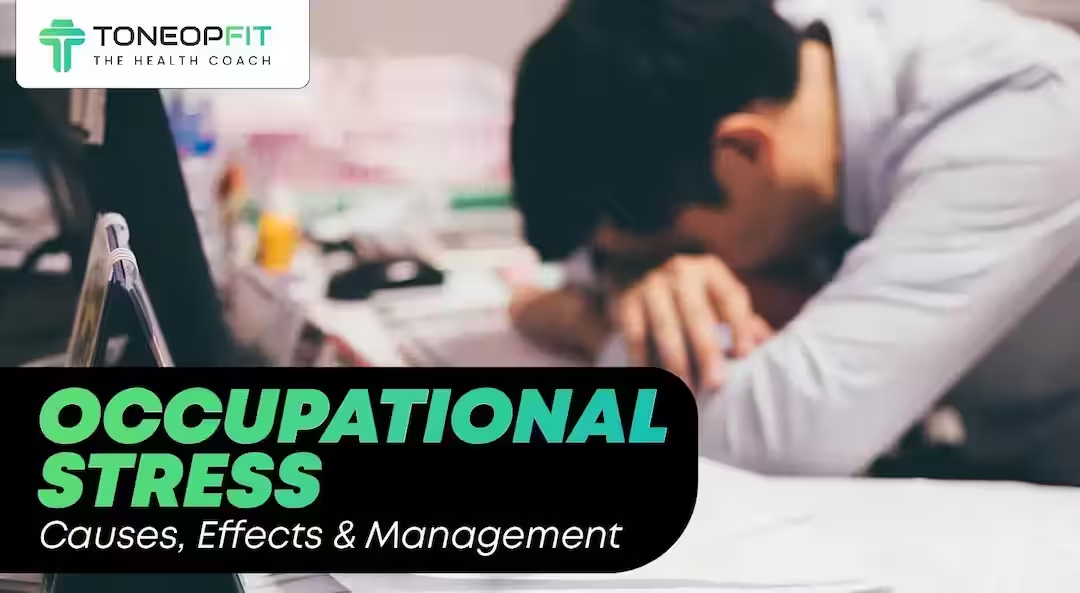Are you feeling tired all the time, not wanting to go to work, or experiencing physical problems like headaches, pain in the neck or stomachaches? If so, you might be actually dealing with occupational stress. Many people experience this kind of stress, especially when work becomes overwhelming. It’s important to recognise these feelings because they can affect your happiness and health.
Occupational stress is the pressure and anxiety that comes from our jobs. Some people are more vulnerable to it, like those with heavy workloads, tight deadlines, or difficult bosses. When we face occupational stress, it can make us feel unbalanced in life. It can affect our relationships, our health, and even how we enjoy our free time. Understanding the causes of occupational stress is the first step in finding a way to feel better.
In this blog, we will explore the causes of occupational stress and share essential tips for occupational stress management. Learning this topic will help you identify and understand this concern and then take steps to improve your work life and find more peace and happiness. So, let’s get in and discover how to manage stress at work!
Table Of Contents
- What Is Occupational Stress?
- 7 Main Causes Of Occupational Stress
- What Are The Side Effects Of Occupational Stress?
- Occupational Stress Management: 7 Tips To Help You Destress Easily
- Expert’s Advice
- The Final Say
- FAQs
- References
What Is Occupational Stress?
Job stress occurs when the requirements of a job do not align with an employee's skills, resources, or personal needs. It can impact anyone, regardless of their occupation or field of work, and is not limited to a particular industry or profession.
Work stress can occur due to various reasons like heavy workload, job instability, inadequate support, or a negative work atmosphere. Extended periods of being exposed to work-related stress can result in serious health problems and reduced job effectiveness, posing a significant worry for both workers and employers.
Also Read: Top 9 Tips For Work-Life Balance At Work With 5 Incredible Benefits!
7 Main Causes Of Occupational Stress

Let’s have a look at the main causes of occupational stress:
1. Workload and Time Pressure
Heavy workloads and strict deadlines are major factors in causing work-related stress. Employees frequently experience feelings of being overburdened when they are given too many tasks to complete in a short period of time.
The stress of meeting deadlines can result in anxiety, reduced job happiness, and burnout. The continuous pressure to work at a high level without sufficient breaks can also have a detrimental effect on an employee's physical and mental well-being.
Over time, prolonged tension can lead to lasting occupational stress, impacting both individuals' wellness and decreasing productivity and job performance across the organisation.
2. Role Ambiguity and Conflict
Role ambiguity arises when employees lack clarity on their job duties, objectives, or anticipations, resulting in confusion and irritation. Role conflict occurs when there are opposing demands or expectations from various stakeholders or when job duties clash with personal values or priorities.
Role ambiguity and role conflict both lead to confusion and anxiety as employees try to grasp their job responsibilities. Uncertainty can impede decision-making and productivity, lower job satisfaction, and raise anxiety, ultimately impacting overall performance and workplace cohesion.
3. Job Insecurity
Anxiety about job loss or career uncertainty is a significant cause of work-related stress. In a setting with frequent layoffs, restructuring, or downsizing, employees may constantly worry about their job stability. This anxiety may result in long-term stress, impacting mental and emotional health.
Job uncertainty can also detract from motivation by giving employees the impression that their contributions are not appreciated or that their position within the company is unsure. The ongoing concern regarding joblessness could impact focus, efficiency, and loyalty to the company, leading to lower performance and morale.
4. Lack of Control and Autonomy
Stress levels tend to increase when employees perceive they have limited control over their work tasks, schedules, or decision-making processes. Lacking autonomy can lead to employees feeling powerless, unappreciated, and excessively controlled. The feeling of being unable to control their work environment or make valuable contributions can result in frustration and dissatisfaction for employees.
Furthermore, limited independence hinders originality and invention, and workers might be hesitant to suggest fresh concepts or show initiative. Over time, a lack of control can lead to burnout and lower job engagement.
5. Poor Working Relationships
Unfavourable encounters with co-workers, managers, or employees can lead to a hostile work atmosphere, leading to work-related stress. Feelings of isolation, resentment, and frustration can arise from interpersonal conflicts, poor communication, or workplace bullying. Having weak working relationships can also hinder collaboration and teamwork, as employees may perceive a lack of support or appreciation.
The tension resulting from troubled relationships impacts both mental and emotional health as well as decreases efficiency and job contentment. Over a period of time, ongoing interpersonal problems can result in a harmful work environment, causing more employees to be absent and leave the company.
6. Inadequate Work-Life Balance
Maintaining well-being is essential by managing work responsibilities along with personal and family life. When employees have to work extended periods, participate in excessive overtime, or always be accessible for work-related responsibilities, their work-life balance is disturbed.
This lack of balance could result in employee stress as they try to juggle work and personal responsibilities. Not being able to find the best time to exercise can take a physical toll on yourself, while not being able to spend moments with your family can lead to burnout, tiredness, and emotional fatigue. Over time, an imbalance between work and personal life can result in health problems, lower job fulfilment, and a decline in total well-being.
7. Lack of Support and Resources
Workers experiencing heightened occupational stress are typically those who are not provided with sufficient support, training, or resources by their employees. Essential tools or information for tasks can lead to frustration and feelings of incompetence.
Employees may feel isolated and undervalued, leading to increased anxiety and decreased job satisfaction due to a lack of support from supervisors or colleagues. If employees are not properly prepared for job tasks, they may find it difficult to reach their objectives, resulting in decreased performance and motivation. Consistent lack of assistance can lead to long-term stress and dissatisfaction with one's job.
Also Read: Explore Top 5 Isometric Neck Exercises For Neck With Sides Rules!
What Are The Side Effects Of Occupational Stress?
Occupational stress can have the following side effects:
Occupational Stress Side Effects | Explanation |
| Physical Health Effects |
|
| Psychological Effects |
|
| Behavioural Effects |
|
| Impact on Work Performance |
|
| Strain on Interpersonal Relationships |
|
Also Read: Try These 8 Easy Office Yoga Poses To Boost Productivity At Your Workplace!
Occupational Stress Management: 7 Tips To Help You Destress Easily
Effective stress management is crucial to maintaining a healthy and productive workforce. In order to manage and lower occupational stress, employers and employees must work together. The following strategies can help in this endeavour:
1. Time Management and Prioritisation
Learning to manage time effectively and prioritise tasks can significantly reduce stress. Employees should divide more complex projects into smaller, more manageable segments and concentrate on finishing high-priority activities first. They should also learn to prioritise mental health exercises to enhance productivity and concentration. Strategies for managing your time, like the Eisenhower Matrix or the Pomodoro Technique, can be helpful.
2. Developing Coping Mechanisms
Employees should develop healthy coping mechanisms to manage stress. Techniques such as yoga for mental relaxation, sitting exercises, and practising mindfulness can ease anxiety and promote mental calmness. Other important aspects of occupational stress management include getting enough sleep daily, following a balanced diet plan and working out regularly.
3. Seeking Support
Employees should not hesitate to seek support from colleagues, supervisors, or mental health professionals when needed. Establishing a strong support network at work and outside can provide emotional comfort and practical assistance during stressful times.
4. Promoting a Positive Work Environment
Employers should foster a positive work culture that values open communication, mutual respect, and collaboration. Recognising and rewarding employees' efforts, providing constructive feedback, and encouraging a sense of belonging can enhance job satisfaction and reduce stress.
5. Setting Realistic Goals
Setting achievable goals and expectations is crucial in preventing occupational stress. Employers should ensure that employees' workloads are manageable and aligned with their capabilities. Unrealistic expectations can lead to frustration and burnout, whereas attainable goals boost confidence and motivation.
This is also applicable when planning your fitness routine. If you plan to work intensely every day before or after work, you will very likely fall out of the routine. Instead, add variety to your workout and try to exercise 150 minutes a week to attain the benefits of physical activity.
6. Encouraging Work-Life Balance
Companies should encourage employees to take breaks, provide flexible work schedules, and discourage working excessive overtime in order to foster work-life balance. In turn, workers should draw boundaries between their personal and professional lives, such as not answering work-related calls or emails after hours.
7. Providing Resources and Training
Employers should invest in providing adequate resources, training, and support to employees. Access to training programs, workshops, and development opportunities can enhance employees' skills and confidence, reducing stress related to job performance.
Also Read: 8 Best Independence Day Exercises And Health Tips You Must Follow This Year!
Expert’s Advice
As a health expert, I always prioritise looking after mental health, especially when it comes to occupational stress management. Regular exercise is essential, as it helps reduce stress and boosts energy levels. Adding energy-boosting foods to your diet can also enhance your focus and mood.
Don't forget to take breaks—spending time on activities like puzzles can refresh your mind. Additionally, using productivity tools can help you stay organised and reduce overwhelm. To track your fitness and wellness journey, I recommend the ToneOp Fit app to help you stay on top of your health goals.
Health Expert
Akshata Gandevikar
The Final Say
As technology advances further, our workload also increases, and occupational stress can become a major problem for both companies and workers. It is important that employees strive to improve their work environment by recognising the causes, effects, and management strategies of health issues. Decreasing job-related stress not only improves employee health but also increases organisational performance and success.
By being mindful, providing assistance, and implementing successful stress relief techniques, work-related stress can be well controlled, resulting in a more joyful, robust, and healthier staff.
FAQs
1. Can occupational stress affect fitness levels?
Yes, occupational stress can negatively impact fitness levels by making it harder for people to exercise and stay active. When stress is high, many individuals may feel too tired or overwhelmed to work out.
2. Are there any productivity tools that can help me manage occupational stress?
You can try these productivity tools to manage your workload and keep occupational stress at bay:
- Trello
- Asana
- Todoist
- Slack
- RescueTime
3. What is a simple occupational stress management plan?
Here is what you need to do:
- Identify stress triggers at work.
- Set clear goals for tasks.
- Take regular breaks to relax.
- Practice deep breathing exercises.
- Stay active with regular exercise.
- Talk to someone about your feelings.
4. What are common signs of occupational stress?
Common signs of occupational stress include irritability, anxiety, fatigue, headaches, difficulty concentrating, and changes in sleep patterns. Employees may also experience decreased motivation, low productivity, frequent absenteeism, and increased conflicts with colleagues. It can also show physical signs like muscle tension and digestive issues.
References
- https://www.who.int/news-room/questions-and-answers/item/ccupational-health-stress-at-the-workplace
- https://www.betterhealth.vic.gov.au/health/healthyliving/work-related-stress
- https://remote.com/en-in/resources/hr-glossary/occupational-stress
- https://remote.com/en-in/resources/hr-glossary/occupational-stress
- https://online.csp.edu/resources/article/work-stress/
- https://business.talkspace.com/articles/10-main-causes-of-stress-in-the-workplace
- https://wethrive.net/mental-health-at-work/the-top-10-causes-of-stress-at-work/
About ToneOp Fit
ToneOp Fit is a platform dedicated to improving and maintaining good health through a comprehensive range of goal-oriented health plans with up to 3 Coach support. With a range of Weight Management, Medical Condition, Detox Plans, and Face Yoga Plans, the app also provides premium health trackers, recipes and health content. Get customised diet, fitness, naturopathy & yoga plans and transform yourself with ToneOp.









































